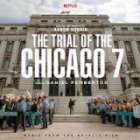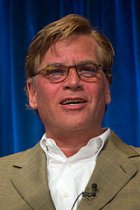
The Trial of the Chicago 7 Page #21
- Year:
- 2020
- 276 Views
204 INT. CONSPIRACY OFFICE -NIGHT 204
KUNSTLER:
Were you resisting arrest?
150.
TOM:
They pushed us through the window.
KUNSTLER:
You overrun the riot police-
And now TOM and KUNSTLER begin talking over each other at the
same time-
KUNSTLER (CONT'D) TOM
--make it past the tear gas, (simultaneously)
make it past the national Which is more than Rennie can
guard, find an open bridge, say! Over 400 people admitted
you can practically reach to area hospitals with severe
your hand out and touch the injuries! They had armored
convention and you gave vehicles! Bayonets! They took
yourself up peacefully? off their name tags and
badges! We were trying to
protest peacefully at the
f***ing convention!
205 INT. HAYMARKET TAVERN -NIGHT 205
TOM is sitting on the floor in the rubble and the
aftermath...He sees ABBIE sitting against a wall in
handcuffs...They’re both bleeding and they share a look of
defeat...
POLICEMAN (O.S.)
Hands behind your back.
TOM:
(pause)
Yeah.
206 INT. CONSPIRACY OFFICE -NIGHT 206
KUNSTLER:
Who started the riot, Tom?
TOM is spent. After a moment he says a word that doesn’t mean
to make sense by itself...
TOM:
(pause)
“Our”.
KUNSTLER:
(pause)
What?
151.
TOM:
(beat)
“Our”. “Our blood”.
ABBIE puts it together...
ABBIE:
(pause)
“Our” blood. If “our” blood is
going to flow--you meant to say,
“If ‘our’ blood is going to flow,
let it flow all over the city.” You
didn’t mean the cops, you were
saying if they’re going to beat us
up then everyone should see it.
KUNSTLER:
(quietly)
Jesus Christ.
ABBIE:
You do this-
(to KUNSTLER)
He does this, it’s a pattern. Read
his portion of the Port Huron
Statement. He implies possessive
pronouns and he uses vague noun
modifiers.
TOM looks at ABBIE...
TOM:
(pause)
You read the Port Huron Statement?
ABBIE:
I’ve read everything you’ve
published.
TOM:
I didn’t know that.
ABBIE:
You’re a talented guy. Except for
the possessive pronouns and the
vague-
TOM:
I know.
And for the first time, TOM is able to allow himself a
laugh...then-
152.
TOM (CONT'D)
(to KUNSTLER)
Put Abbie on the stand instead.
JUDGE HOFFMAN (V.O.)
Would you state your full name for
the record please.
207 INT. COURTROOM -DAY 207
ABBIE’s on the stand.
ABBIE:
It’s Abbie.
JUDGE HOFFMAN:
Your last name.
ABBIE:
My grandfather’s name was
Shaboysnakoff but he was a Russian
Jew protesting anti-semitism so he
was assigned a name that would
sound like yours.
JUDGE HOFFMAN:
What is your date of birth?
ABBIE:
Psychologically, 1960.
JUDGE HOFFMAN:
What were you doing until 1960?
ABBIE:
Nothing really. It’s called an
American education.
JUDGE HOFFMAN:
Why don’t we just proceed with the
testimony.
ABBIE:
Sure.
KUNSTLER:
Do you know why you’re on trial
here?
ABBIE:
We carried certain ideas across
state lines. Not machine guns or
drugs or little girls.
(MORE)
153.
ABBIE (CONT'D)
When we crossed from New York to
New Jersey to Pennsylvania to Ohio
to Illinois, we had certain ideas.
And for that, we were gassed,
beaten, arrested and put on trial.
In 1861, Lincoln said in his
Inaugural address that, “When the
people shall grow weary of their
Constitutional right to amend their
government, they shall exert their
revolutionary right to dismember
and overthrow that government.” And
if Lincoln had given that speech in
Lincoln Park last summer he’d be on
trial with the rest of us.
KUNSTLER:
How do you overthrow and dismember
a government peacefully?
ABBIE:
In this country we do it every four
years.
KUNSTLER:
That’s all.
KUNSTLER sits.
SCHULTZ smiles a little...
SCHULTZ:
So Chicago was just a massive voter
registration drive.
ABBIE:
(laughs)
Yeah.
SCHULTZ:
Did you hear the tape that was
played in court of Mr. Hayden at
the bandshell?
ABBIE:
Yes.
SCHULTZ:
You heard the tape?
ABBIE:
Yes.
154.
SCHULTZ:
Did you hear Mr. Hayden give an
instruction to his people to take
to the streets?
ABBIE:
His people. Hayden’s not a mafia
Don and neither am I.
SCHULTZ:
Did you hear him say, “If blood is
gonna flow, let it flow all over
the city”?
ABBIE:
The beginning of the sentence was
supposed to be-
(beat--forget it)
Yes. Yes I did.
SCHULTZ:
What do you think of that?
ABBIE:
I think Tom Hayden’s a badass of an
American patriot.
SCHULTZ:
I didn’t ask what you thought of
the man, I asked what you thought
of his instruction to the crowd.
ABBIE:
You know, I’ve heard Tom Hayden
say, “Let’s end the war” too but
nobody stopped shooting. You can do
anything to anything by taking it
out of context, Mr. Schultz.
SCHULTZ:
Is that right?
ABBIE:
A guy once said, “I am come to set
a man at variance with his father.
And the daughter against her
mother.” You know who said it?
SCHULTZ:
Jerry Rubin?
ABBIE:
(laughing a little)
Yeah. No. It was Jesus Christ.
(MORE)
155.
ABBIE (CONT'D)
Matthew 10:
34. And it sure soundslike he’s telling kids to kill
their parents. Until you read
Matthew 10:
33 and 10:35.SCHULTZ:
Did you-
ABBIE:
He’d just seen his best friend get
hit in the face with a nightstick.
The police, Mr. Schultz, whose
people are they?
SCHULTZ:
Do you have contempt for your
government?
ABBIE:
(laughing)
Do I-
SCHULTZ:
Do you have contempt for your
government?
ABBIE:
I think the institutions of our
democracy are wonderful things
that, right now, are populated by
some terrible people.
SCHULTZ:
Please answer the question.
ABBIE:
Tell me again?
SCHULTZ:
Do you have contempt for your
government?
ABBIE:
I’ll tell you, Mr. Schultz, it’s
nothing compared to the contempt my
government has for me.
SCHULTZ:
We’ve heard from 27 witnesses
who’ve testified under oath that
you hoped for a confrontation with
the police.
(MORE)
156.
SCHULTZ (CONT'D)
That your plans for the convention
were specifically designed to draw
the police into a confrontation.
ABBIE:
If I’d known it was going to be the
first wish of mine that came true I
would’ve aimed higher.
SCHULTZ:
It’s a yes or no question. When you
came to Chicago were you hoping for
a confrontation with the police?
ABBIE says nothing for a moment...
SCHULTZ (CONT'D)
I’m concerned that you have to
think about it.
ABBIE:
Gimme me a moment, would you
friend? I’ve never been on trial
for my thoughts before.
FADE TO BLACK:
TITLE:
Trial Day 113
208 INT. COURTROOM -DAY 208
We see some familiar faces in the gallery. DAVE’S FAMILY,
HOWARD, DAPHNE, BERNADINE...and we now see that FROINES and
WEINER are in the front row of the gallery too, no longer
with the defendants.
We HEAR a heavy door open on the side and the gallery hushes,
their eyes fixed on the side door.
The DEFENDANTS are led in wearing prison coveralls. They
exchange looks with FROINES and WEINER as they’re led to the
defense table.
Translation
Translate and read this script in other languages:
Select another language:
- - Select -
- 简体中文 (Chinese - Simplified)
- 繁體中文 (Chinese - Traditional)
- Español (Spanish)
- Esperanto (Esperanto)
- 日本語 (Japanese)
- Português (Portuguese)
- Deutsch (German)
- العربية (Arabic)
- Français (French)
- Русский (Russian)
- ಕನ್ನಡ (Kannada)
- 한국어 (Korean)
- עברית (Hebrew)
- Gaeilge (Irish)
- Українська (Ukrainian)
- اردو (Urdu)
- Magyar (Hungarian)
- मानक हिन्दी (Hindi)
- Indonesia (Indonesian)
- Italiano (Italian)
- தமிழ் (Tamil)
- Türkçe (Turkish)
- తెలుగు (Telugu)
- ภาษาไทย (Thai)
- Tiếng Việt (Vietnamese)
- Čeština (Czech)
- Polski (Polish)
- Bahasa Indonesia (Indonesian)
- Românește (Romanian)
- Nederlands (Dutch)
- Ελληνικά (Greek)
- Latinum (Latin)
- Svenska (Swedish)
- Dansk (Danish)
- Suomi (Finnish)
- فارسی (Persian)
- ייִדיש (Yiddish)
- հայերեն (Armenian)
- Norsk (Norwegian)
- English (English)
Citation
Use the citation below to add this screenplay to your bibliography:
Style:MLAChicagoAPA
"The Trial of the Chicago 7" Scripts.com. STANDS4 LLC, 2025. Web. 11 Jan. 2025. <https://www.scripts.com/script/the_trial_of_the_chicago_7_25401>.



Discuss this script with the community:
Report Comment
We're doing our best to make sure our content is useful, accurate and safe.
If by any chance you spot an inappropriate comment while navigating through our website please use this form to let us know, and we'll take care of it shortly.
Attachment
You need to be logged in to favorite.
Log In